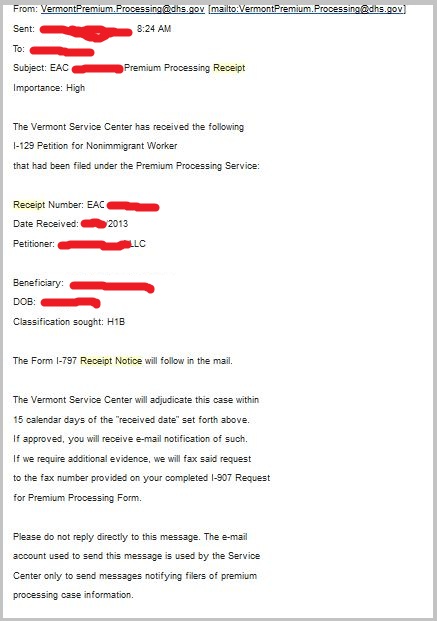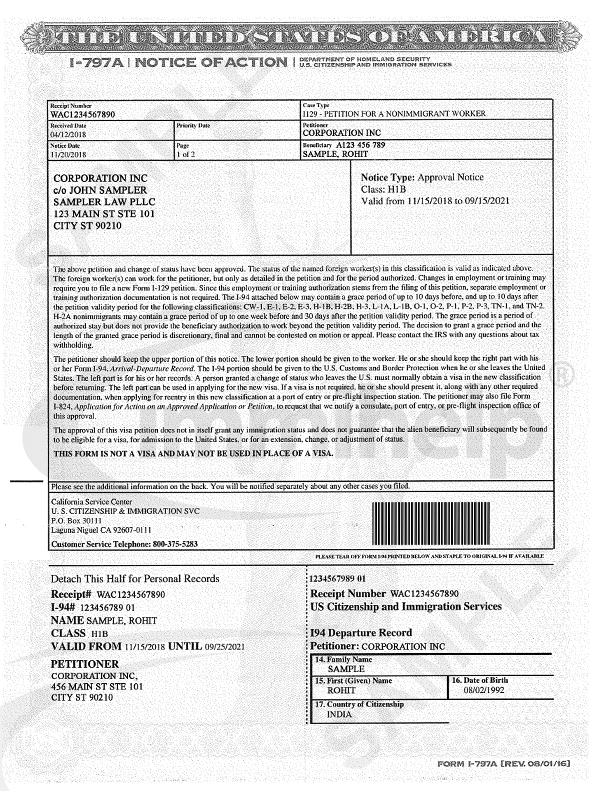
See 7 key topics from this page & related content
See 7 key topics from this page & related content
See 7 key topics from this page & related content

How much does an immigration attorney cost?
Some wait until problems arise before doing so, while others retain an attorney to streamline the process from end to end. Having an attorney handle the application process can improve the chances of acceptance, especially in more complex cases. The cost of an immigration attorney varies greatly, from anywhere from $500 to $3000 or more.
Who pays premium processing fee?
This fee is optional and does not improve the applicant’s chances of being accepted. The Premium Processing fee may be paid by either the employee or the employer. If the employee pays the premium fee the application must be accompanied with an explanation written by the employer detailing why this was necessary.
What is the AICWA fee?
The AICWA Act of 1998 imposed a fee on businesses for hiring and training foreign nationals rather than American workers and is also known as the “training” fee.
How much does AICWA charge for hiring foreign nationals?
The fee for businesses with 1-25 full-time employees is $750, while businesses with over 25 full-time employees must pay $1500. Certain institutions hiring foreign nationals are exempted from this fee, though, ...
Is it difficult to get an H1B visa?
The H1-B is one of the most prized visas among foreign nationals seeking to immigrate to the United States, with a precious few granted to some of the most skilled and accomplished of applicants. Obtaining an H1-B visa can be very difficult (check out our H1B visa guide if you want to give yourself the best chance of getting one), ...
Can my H-1B Visa Fees be Refunded?
Typically the USCIS retains the fee regardless of whether the application is accepted or not. However, if an application was entered into the annual lottery and not selected, the USCIS will refund the fee. Applicants may also receive a refund if:
How much does it cost to get an H1B visa?
Besides the $190 for the H1B application at the embassy additional fees you have to pay for the H1B visa are:
When does the H1B visa open?
The applications open every year in spring. USCIS approves around 65,000 petitions per year starting from October 1 st to September 30 th of the following year. 6,800 petitions are reserved for H1B1 visas for Chile and Singapore nationals, while the rest for H1B visas. The applications of the first 20 thousand applicants with a master’s degree are exempt from this visa cap.
How Long Can I Stay in the US with an H1B Visa?
The H1B visa is initially valid for 3 years but can extend for another 3 years. In total, a person can stay and work in the US for 6 years at most. However, that does not mean that the person must return to their home country. What makes the H1B visa popular is that it is a dual intent visa.
How to Extend the H1B Visa?
The H1B extension procedures are similar to the initial application process. You will need to pay the same fees, except for the Fraud Prevention and Protection Fee. Your employer will also have to follow the same procedures for getting certification from DOL and an approved petition from USCIS. In addition, you will submit these documents:
What is H1B Visa Stamping?
In case you are granted an H1B visa, you need to go on and apply for the H1B visa stamping. This a process on its own, and you should check out the H1B visa stamping article for more details.
How to See My H1B Status Updates?
When your employer submits the H1B visa petition, you will receive a 13-digit receipt number which you can use to check on your H1B status on the USCIS website . The receipt number starts with an “ EAC, WAC, LIN, SRC, NBC, MSC or IOE” and is followed by 10 numbers. Your status could state one of the following:
What is an H1B amendment?
The H1B Amendment requires US employers to file an amended petition in case the employee has any material changes. Material changes are defined as anything that impacts the employee’s eligibility for an H1B visa. The USCIS does not give a list of what qualifies as such a change, but examples include:
If You Are an H-1B Petitioner
You must pay the additional $4,000 fee if all of the following apply to you:
If You Are an L-1 Petitioner
You must pay the additional $4,500 fee if all of the following apply to you:
What is an H1B visa?
The H1B is a special visa that allows foreign nationals to perform specialty occupations in the United States. This work can be in - but is not limited to - any of the following fields:
What is H1B in the US?
The H1B allows foreign nationals to perform specialty occupations in the United States. This allows highly qualified individuals to work and live in the US. This benefits both the beneficiaries and the US economy.
How long can a beneficiary stay in the US?
If there is a change in worksite, a new labor condition application must also be submitted. If the job ends unexpectedly, the beneficiary may stay for up to 60 days or until the visa expires, whichever is shorter. During this time, the beneficiary may attempt to find a new employer to remain in the US but may not work. It is important to note if there are any changes to a beneficiary’s job position or to the US company. Here, an immigration lawyer can help you determine what steps are required to be in compliance with the H1B visa program.
How long do you have to work to get an H1B visa?
Begin work in the United States. H-1B beneficiaries may arrive in the United States up to 10 days before the start date of their petition and stay up to 60 days (with some exceptions) after the termination of their H1B status. Upon arrival, you should present your passport, H1B visa, and Form I-797 approval.
What are the benefits of H1B?
One big advantage of H1B visa is the portability benefits. This means that if you are on an H1B and change employers, you can begin working for a different employer upon filing your new petition.
How long before I can apply for a visa can I apply for a visa?
Note that you cannot apply for a visa more than 90 days before the start date of the job . Upon scheduling a consular interview, the foreign national will meet with a US consular officer and show them their I-797 approval.
How to extend a bona fide job offer?
This can be through a written contract or, if there is no written contract, through a summary of an oral agreement. Additionally, there must be evidence to support the need for the beneficiary.
Overview
The H-1B program applies to employers seeking to hire nonimmigrant aliens as workers in specialty occupations or as fashion models of distinguished merit and ability. A specialty occupation is one that requires the application of a body of highly specialized knowledge and the attainment of at least a bachelor’s degree or its equivalent.
Key News
On January 15, 2021, the U.S. Department of Labor (Department) issued an Office of Foreign Labor Certification H-1B Program Bulletin and a Wage and Hour Division Field Assistance Bulletin (FAB) revising its interpretation of its regulations concerning which employers of H-1B workers must file Labor Condition Applications.
How much is the ACWIA?
American Competitiveness and Workforce Improvement Act of 1998 (PDF) (ACWIA) $1,500. Fee may be included in the same check or money order with the base petition fee; however, a separate payment is preferred. The beneficiary is not permitted to pay the ACWIA fee.
Do I have to pay additional fees for I-129?
You may be required to pay additional fees when filing Form I-129 for an H or L nonimmigrant. The following charts explain which Acts and Public Laws (Pub. L.) require additional fees for H and L nonimmigrant petitions. Please note that all USCIS forms are available free of charge at www.uscis.gov/forms.
Can you pay ACWIA fee on same check?
Fee may be included in the same check or money order with the base petition fee; however, a separate payment is preferred. The beneficiary is not permitted to pay the ACWIA fee. That would be considered an offset against wages and/or benefits paid as stated on the Labor Condition Application.
Can a beneficiary pay the ACWIA fee?
The beneficiary is not permitted to pay the ACWIA fee. That would be considered an offset against wages and/or benefits paid as stated on the Labor Condition Application. The H-1B Visa Reform Act of 2004 (part of Pub. L. 108-447 (PDF)) permanently extended and increased the ACWIA fee.
